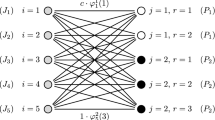Abstract
The general problem scenario of this paper is the following: Jobs of various priorities, stationed in a common storage area, are waiting to be dispatched to two non-identical workstations. Any of the waiting jobs can be accessed from the storage at any given time. Each job can be processed on either of the workstations, but once a job has been assigned it may not be preempted. By job priority it is meant that a higher priority job has disptach preference over a lower priority job. The processing time of a job on a given workstation is assumed to be random, the distribution being dependent on the job type and the configuration of the workstation.
Specifically, the first problem studied considers only two classes of jobs: (1) “hot” jobs, whose processing is to be expedited and thus have the higher dispatch priority, and (2) “routine” jobs which may be assigned to an available workstation only if the workstation has been rejected by all “hot” jobs. The processing times are assumed to be exponentially distributed with means depending on the job class and workstation. We assume that, on the average, one workstation is faster than the other with regard to processing any job. The dispatching objective for each job class is to minimize its expected flowtime. It is shown that threshold dispatching policies are optimal for this problem. That is, the faster processor should be utilized whenever possible, and for each class there exists an explicit threshold such that when the number of jobs of that class in the buffer exceeds this threshold then a job of that class is dispatched to the slower processor, otherwise these jobs wait for the faster processor to become available. For the higher priority jobs, this threshold is shown to be a function only of the various processing rates of the two workstations. For the lower priority jobs, the threshold also depends on the number of higher priority jobs in the buffer.
The results is extended to a system with n priority classes. Again, it is shown that when the processing times are exponentially distributed with different rates and the dispatching objective for each class is to minimize its expected flowtime, the optimal dispatching policies are of threshold type. Explicit thresholds are easily derived.
Similar content being viewed by others
References
Agrawala, A.K., Coffman, E.G. Jr., Garey, M.R., and Tripathi, S.K., “A Stochastic Optimization Algorithm Minimizing Expect Flowtime on Uniform Processor”, IEEE Transactions on Computers, Vol. C-33, pp 351–357 (1984).
Coffman, E.G., Flatto, L., Garey, M.R., and Weber, R.R., “Minimizing Expected Makespan on Uniform Processors Systems”, Advances in Applied Probability, Vol. 19, pp 177–201 (1987).
Lawler, E.L., Lenstra, J.K., and Rinnooy Kan, A.H.G., “Recent Developments in Deterministic Sequencing and Scheduling: A Survey”, in Deterministic and Stochastic Scheduling, M.A.H., Dempster, J.L., Lenstra, and A.H.G., Rinnooy Kan (Eds.), Reidel/Kluwer, Dordrecht, The Netherlands (1982).
Weber, R.R., “Scheduling Jobs with Stochastic Process Requirements on Parallel Machines to Minimize Makespan or Flowtime”, Journal of Applied Problems, Vol. 19, pp 167–182 (1982).
Weiss, G. and Pinedo, M., “Scheduling Tasks with Exponential Service Times on Non-identical Processors to Minimize Various Cost Functions”, Journal of Applied Probability, Vol. 17, 187–202 (1980).
Xu, S.H., Mirchandani, P.B., and Kumar, S.P.R., “Stochastic Dispatching of Increasing Hazard Rate Jobs to Heterogeneous Processors”, Technical Report TRS 8702, Operations Research and Statistics Program, Rensselaer Polytechnic Institute, Troy, NY (February 1988).
Author information
Authors and Affiliations
Rights and permissions
About this article
Cite this article
Mirchandani, P.B., Xu, S.H. Optimal dispatching of multipriority jobs to two heterogeneous workstations. Int J Flex Manuf Syst 2, 25–42 (1989). https://doi.org/10.1007/BF00227796
Issue Date:
DOI: https://doi.org/10.1007/BF00227796




